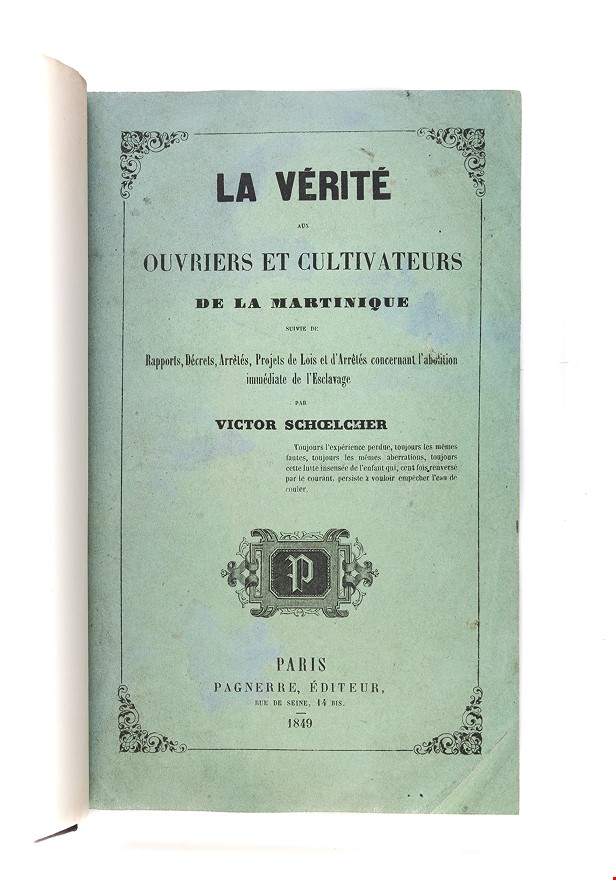Le Vérité aux Ouvriers et Cultivateurs de la Martinique
SCHOELCHER Victor (1849.)
£5000.00 [First Edition]
Please contact us in advance if you would like to view this book at our Curzon Street shop.
A SENSATIONAL ATTACK ON A FELLOW ABOLITIONIST
suivie de Rapports, Décrets, Arrêtés, Projets de Louis et d'Arrêtés concernant l'abolition immédiate de l'Esclavage...
First edition. 8vo. Quarter black morocco over marbled boards, vellum tips, spine gilt, original green printed wrappers bound in. 470pp. Paris, Pagnerre,
An excellent copy of this rare work by the pre-eminent French abolitionist of the nineteenth century. Here he takes on another famed abolitionist, Cyrille Bissette, a free person of colour from Martinique. This is an extraordinary work of one abolitionist attacking another: something akin to William Wilberforce publishing a book-length condemnation of Ignatius Sancho.
The book was published in the immediate wake of the 1848 abolition, for which Schoelcher was a key figure and, in his capacity as undersecretary of the French Navy, actually wrote the decree. Schoelcher worked tirelessly toward the abolition of slavery in the Caribbean in particular. He was the first European abolitionist to visit post-rebellion Haiti and opposed claims for reparations by plantation owners on the island. He published his first work on the horrors of slavery in 1833 and continued to argue for it in print through to 1875.
Bissette was, in fact, an early supporter of Schoelcher's, writing one of the few positive reviews of his 1840 work, Abolition de l'Esclavage... Both advocated for immediate emancipation, but fell out in 1842. Ostensibly, it was over Schoelcher's Des colonies françaises abolition immediate de l'esclavage, which Bissette called "un mauvais livre", but it was partly due to Bissette's jealousy at the sudden rise to prominence of Schoelcher, and further, for being patronised and excluded by white abolitionists. Indeed, he pointedly created the Club des Amis des Noirs. Notwithstanding, by the time this work was published, Bissette had been elected to the French parliament as a representative of Martinique. Their correspondence is reprinted here and we gain a rare and extensive insight into the internal debates within the French abolitionist movement.
In nineteen provocatively titled chapters ("Calomnies morales", "Coalition des Haines", "Terroriste", "Les Partagaux et les Assassins"), Schoelcher tackles the many differences between them. Their rancour was by no means diminished by the actual passing of the act. Jackie Ryckebusch in her 2005 work, Inventaire des ouvrages..., sums it up neatly: "C'est livre, plutôt accablant pout l'ambitieux Bissette, va bien au-delà de cette simple polémique puisqu'il aborde tous les sujets sensibles: organisation du travail, indemnité, compensation, suffrage universel et la nécessaire alliance des noirs et des mulâtres." ["This book, rather overwhelming for the ambitious Bissette, goes well beyond this simple controversy since it addresses all sensitive issues: organization of work, indemnity, compensation, universal suffrage and the necessary alliance of blacks and female mulattos."]
Bissette is a fascinating and complicated character in his own right: born in Martinique in 1795, he was himself a slave owner and in the early 1820s even assisted in the suppression of a slave revolt at Cabaret in north Martinique. His life changed dramatically with his arrest in 1823 on charges of plotting to overthrow the French government. This was actually part of a plan by the French who were concerned at being suddenly outnumbered by free persons of colour on the island. During his arrest he was branded and exiled from French territories. However, upon release, he became a leader of that community in France as well as Martinique and initiated a campaign for equal rights. Indeed, between 1828-34, he published twenty-one brochures on the subject and later launched the Revue des colonies. However well intended this publishing program was, the expenses ran away from Bissette and "he regularly failed to repay loans to friends, colleagues and fellow abolitionists, thus antagonizing potential allies while strengthening his detractors" (Jennings). Bankruptcy soon followed, which had the disastrous consequence of disqualifying him from political office. Schoelcher lost no time in referring to him as a leech and a beggar. Bissette actually published a response to Schoelcher's attack the following year, Résponse au factum de M. Schoelcher intitulé la vérite aux ouvriers et cultivateurs de la Martinique, which Jennings described as "partial or unconvincing."
The French abolition movement "coalesced much later than its British counterpart, lacked unity and displayed little of the fervent commitment to immediate slave liberation that had motivated British abolitionists already in the late 1820s and early 1830s. The moderation of the French anti-slavery movement throughout the 1830s and 1840s, and its hesitancy to press for immediate emancipation, are two of the principal factors explaining why France abolished slavery fifteen years later than Great Britain" (Jennings).
Rare: OCLC lists four copies at NYPL, Nat Lib Chile, BL and BnF. No copies listed in auction records. Ryckebusch, 7440; Sabin, 77751 (incorrectly dated 1840). Bryant, Kelly Duke. "Black but not African" in International Journal of African Historical Studies. Vol. 40, no. 2, 2007. pp251-282; Jennings, Lawrence C. "Cyrille Bissett, Radical Black French Abolitionist" in French History, Vol. 9, No.1, 1995, pp48-66.
https://ageofrevolutions.com/2016/10/10/slavery-and-the-revolutionary-histories-of-1848/
Stock Code: 228947




